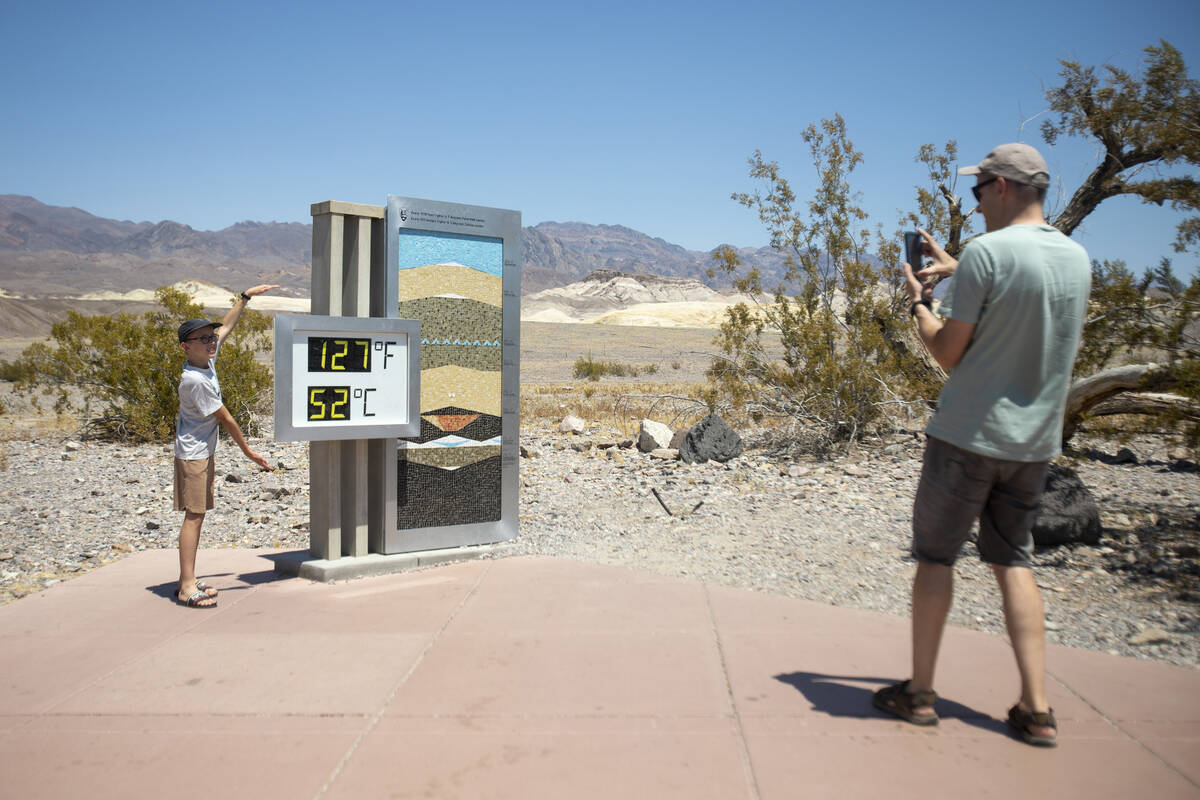Death Valley’s newest honor: Earth’s hottest month on record

Death Valley National Park, known for moving — and melting — the needle for world heat records, has reached yet another new milestone.
The park’s July was the hottest month ever recorded on Earth, with an average temperature of 108.5 degrees. Las Vegas broke its record for July, too, with an average of 99.9 degrees, according to the National Weather Service.
Death Valley’s new record calls into question how much hotter the planet’s hottest place can get as scientists raise the alarm about climate change spurred by the world’s carbon emissions. It’s an unofficial record, a weather service spokesman said, as the World Meteorological Organization needs to ratify the results.
In a statement, park Superintendent Mike Reynolds called attention to how this intense heat shows change over time.
“Six of the 10 hottest summers have come in the past 10 years, which should serve as a wake up call,” Reynolds said. “Record-breaking months like this one could become the norm as we continue to see global temperatures rise.”
RELATED: Small California town dethrones Phoenix as hottest city in the US
RELATED: Las Vegas Valley sets record 99.9 average daily temperature in July
Death Valley’s previous July record for average temperatures was 108.1 degrees in 2018, while Las Vegas’ was 97.3, set last year.
While Death Valley hasn’t cracked its official and disputed all-time record of 134 degrees this summer, Las Vegas broke its all-time record with a temperature of 120 degrees.
Climate Central, a communications firm made up of scientists, reported that Las Vegas’ new record was made five times more likely because of climate change. It also has listed Las Vegas and Reno as the fastest-warming cities in the country.
As new records bubble up more and more frequently, many are calling attention to both Nevada’s and the country’s efforts to mitigate climate change and protect Las Vegans most at risk, whether they’re outdoor workers or homeless people.
Park faces life-threatening emergencies
Any temperature over 120 degrees in Death Valley puts rangers at work playing defense.
Nine days in July saw the park reach 125 degrees at its Furnace Creek Visitor Center, and only seven days didn’t reach 120 degrees.
Staff doesn’t recommend staying outside of air conditioning for more than five minutes at a time in the summer, and all hikes at low elevation must happen early in the morning.
This summer in particular has put the park in national headlines.
A motorcyclist died in the heat before any rescue was available, and another who needed treatment had to wait to be flown by the military to Las Vegas after one contractor declined to fly a rescue helicopter because of the heat.
In a separate emergency, a tourist who lost his flip-flops suffered third-degree burns on his feet after walking on sand dunes.
The National Park Service hasn’t reached a point where it discourages tourism during extreme temperatures, but rangers are emphasizing the importance of staying within a 10-minute walk of an air-conditioned vehicle, drinking water, eating salty snacks, and wearing a hat and sunscreen.
Contact Alan Halaly at ahalaly@reviewjournal.com. Follow @AlanHalaly on X.